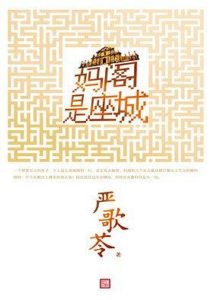A City Called Macau
妈阁是座城
China/Hong Kong, 2019, colour, 2.35:1, 126 mins.
Director: Li Shaohong 李少红.
Rating: 6/10.
Plot-heavy drama centred on two gambling addicts and the woman between them is unengaging, despite good performances and production values.
Macau, 20 Dec 1999. Originally from Beijing but now living in the former Portguese territory with her young son Lele (Hu Xuanxu), Mei Xiao’ou (Bai Baihe), a “casino broker” at the Golden Dragon, arrives home on the evening of the territory’s handover to China. Almost three years later, in Oct 2002, Mei Xiao’ou hosts Mainland property developer Duan Kaiwen (Wu Gang) on one of his gambling sprees. He wins big and calls her his “lucky charm”. Later, during a trip to Beijing to collect a debt owed by another client, Liu (Liang Tian), Mei Xiao’ou meets sculptor Shi Qilan (Huang Jue), who asks to do a bust of her. He subsequently arrives in Macau, saying he wants to get to know his subject better. She shows him round the Golden Dragon and he tries gambling for the first time; he has good luck but Mei Xiao’ou is suspicious of his motives, especially when he disappears without a word. In Apr 2003 Macau is benefiting from the SARS panic, as gamblers are stranded in the territory, including Shi Qilan who’s fallen under the influence  of professional scammer Hua (Peng Jingci). In Oct 2003, when the travel ban is lifted, Shi Qilan’s wife, Chen Xiaoxiao (Wei Lu), calls Mei Xiao’ou from Beijing and says her husband has gone AWOL. In 2004 Duan Kaiwen arrives with some business colleagues for another gambling spree. Mei Xiao’ou’s driver/friend Cat (Qian Xiaohao) takes her to Shi Qilan, who’s broke and in debt to Hua; she finds him a place to stay but he starts gambling again. Mei Xiao’ou tells Chen Xiaoxiao to come and collect him, but when Shi Qilan attempts suicide, Chen Xiaoxiao blames Mei Xiao’ou. (Meanwhile, Mei Xiao’ou has explained to Duan Kaiwen how, in the mid-1990s, her husband Lu Jintong [Geng Le] had been hooked on gambling by gangster Shang [Zeng Zhiwei]. When she had left her husband two years after her son was born, Shang had given her his house in Macau when he’d moved to Europe.) In Oct 2008 Macau is booming thanks to tourism from the Mainland. When Duan Kaiwen arrives and asks for credit beyond his usual limit, Mei Xiao’ou promises casino boss Fei (Liu Jialing) that, as usual, she’ll back him as he’s her client. But when he loses big, following losses at other casinos, Mei Xiao’ou finds her house isn’t enough to repay his debt. Duan Kaiwen assures Mei Xiao’ou that he’s good for the money and asks for 10 days’ grace. Fei then tells Mei Xiao’ou that she’s selling the casino to Hua who, after bankrupting his boss Shang by getting Shang’s son Xiaoyang (Yu Xiaotong) into debt, has become very powerful in the territory. In addition, Duan Kaiwen owes even more to Hua than to Mei Xiao’ou. Fei warns her that, if Duan Kaiwen defaults on Hua, Hua will come after Mei Xiao’ou for that debt as well.
of professional scammer Hua (Peng Jingci). In Oct 2003, when the travel ban is lifted, Shi Qilan’s wife, Chen Xiaoxiao (Wei Lu), calls Mei Xiao’ou from Beijing and says her husband has gone AWOL. In 2004 Duan Kaiwen arrives with some business colleagues for another gambling spree. Mei Xiao’ou’s driver/friend Cat (Qian Xiaohao) takes her to Shi Qilan, who’s broke and in debt to Hua; she finds him a place to stay but he starts gambling again. Mei Xiao’ou tells Chen Xiaoxiao to come and collect him, but when Shi Qilan attempts suicide, Chen Xiaoxiao blames Mei Xiao’ou. (Meanwhile, Mei Xiao’ou has explained to Duan Kaiwen how, in the mid-1990s, her husband Lu Jintong [Geng Le] had been hooked on gambling by gangster Shang [Zeng Zhiwei]. When she had left her husband two years after her son was born, Shang had given her his house in Macau when he’d moved to Europe.) In Oct 2008 Macau is booming thanks to tourism from the Mainland. When Duan Kaiwen arrives and asks for credit beyond his usual limit, Mei Xiao’ou promises casino boss Fei (Liu Jialing) that, as usual, she’ll back him as he’s her client. But when he loses big, following losses at other casinos, Mei Xiao’ou finds her house isn’t enough to repay his debt. Duan Kaiwen assures Mei Xiao’ou that he’s good for the money and asks for 10 days’ grace. Fei then tells Mei Xiao’ou that she’s selling the casino to Hua who, after bankrupting his boss Shang by getting Shang’s son Xiaoyang (Yu Xiaotong) into debt, has become very powerful in the territory. In addition, Duan Kaiwen owes even more to Hua than to Mei Xiao’ou. Fei warns her that, if Duan Kaiwen defaults on Hua, Hua will come after Mei Xiao’ou for that debt as well.
REVIEW
 As in some of her previous films (A Wedding Invitation 分手合约, 2013; Monster Hunt 捉妖记, 2015), Mainland actress Bai Baihe 白百何 is the main reason to watch the otherwise problematic A City Called Macau 妈阁是座城, a well-written, well-acted and good-looking adaptation of the 2014 novel (see cover, left) by much-filmed authoress Yan Geling 严歌苓 (The Flowers of War 金陵十三钗, 2011; Youth 芳华, 2017) but one whose script is passionless and unengaging, as well as increasingly novelettish in its over-long second half. Unfortunately, Bai’s name is no longer enough to carry a movie at the box office – where Macau took a less-than-polite RMB50 million this summer – marking a downbeat return to the big screen by veteran director Li Shaohong 李少红, 64, after more than a decade in TV drama.
As in some of her previous films (A Wedding Invitation 分手合约, 2013; Monster Hunt 捉妖记, 2015), Mainland actress Bai Baihe 白百何 is the main reason to watch the otherwise problematic A City Called Macau 妈阁是座城, a well-written, well-acted and good-looking adaptation of the 2014 novel (see cover, left) by much-filmed authoress Yan Geling 严歌苓 (The Flowers of War 金陵十三钗, 2011; Youth 芳华, 2017) but one whose script is passionless and unengaging, as well as increasingly novelettish in its over-long second half. Unfortunately, Bai’s name is no longer enough to carry a movie at the box office – where Macau took a less-than-polite RMB50 million this summer – marking a downbeat return to the big screen by veteran director Li Shaohong 李少红, 64, after more than a decade in TV drama.
Bai, 35, plays the Macau speciality of the so-called “account manager” 客户经理 – aka “casino broker” 叠码仔 (literally, “chip stacker”) – whose job is to encourage punters to gamble; the broker gets a 1% commission on whatever the punter spends on chips but is also personally responsible for any losses. For anyone unfamiliar with the process, it’s only gradually explained as the film progresses, though the general outlines of the job are clear from the start. More of a problem is the script as a whole: the adaptation of Yan’s lengthy novel, by veteran Lu Wei 芦苇 (Farewell My Concubine 霸王别姬, 1993; To Live 活着, 1994; Tuya’s Marriage 图雅的婚事, 2006), Yan herself and Hong Kong’s Chen Wenqiang 陈文强 (Summer Snow 女人四十。, 1995; Dealer/Healer 毒。诫, 2017), is very plot heavy, ticking off the dates and watersheds (1999 Handover, 2003 SARS scare, 2008 financial meltdown) but also trying to cram in too much rather be selective and go with the emotional flow. This tendency becomes more marked as the story progresses, coming close to the structure of TV dramas – not helped by the repetitiousness that afflicts so many movies about addiction (whether gambling or alcohol) as the heroine sees the two men in her life slip off the wagon again and again.
Bai’s character – a divorcee with a young son who was previously married to a gambler – is herself an addict of a sort, to compulsive men (a sculptor, a property developer) in whom she always tries to see the best despite being serially let down. In this respect, she too is a gambler – with her feelings, rather than money, as one character says. “Why is it so difficult to be a decent person?” she complains at one point, seemingly oblivious to the fact that her job involves feeding gamblers’ addiction. This irony is present but not really foregrounded by the screenplay, which opts instead for too much straight narrative and (in the later moments) an almost government-endorsed diatribe against gambling.
Despite the script’s weaknesses, Li draws good performances from most of her cast, led by the typically low-key Bai (in conservative business dress) who internalises much of her character’s predicament in contrast to the rest of the cast. This approach is never better than in a terrific scene almost an hour in, where she dines with a debtor, hiding her anger under contained talk until she realises he never intends to pay her back. Both here and in other scenes Wu Gang 吴刚, 56, more often seen in character roles as a Party official or shifty villain, is excellent, moving from charm through lies to arrogant self-deception with total conviction. Wu’s property speculator is more fully drawn and more interesting than the arty sculptor of Huang Jue 黄觉, 45, whose association with director Li goes back to the surreal Baober in Love 恋爱中的宝贝 (2004) and her last released movie, psycho-horror The Door 门 (2007), as well as her so far unreleased rom-com A Fangirl’s Romance 迷妹罗曼史 (shot in 2016). Huang’s playing lacks punch and the character hardly justifies its resurrection in the finale.
Other roles are okay, from Hong Kong’s Peng Jingci 彭敬慈 as an ambitious scammer-cum-gangster to his compatriot Qian Xiaohao 钱小豪 as the lead’s faithful associate-cum-driver. Hong Kong veterans Zeng Zhiwei 曾志伟 [Eric Tsang] and Liu Jialing 刘嘉玲 [Carina Lau] pop up as a ruthless but kindly gangster and a tough casino boss. Li’s d.p. husband, Zeng Nianping 曾念平, and Hong Kong editor/stylist Zhang Shuping 张叔平 [William Chang] give the whole thing a gorgeous look but can’t instil much emotional warmth in such a schematic artifact.
CREDITS
Presented by Rosat Media & Entertainment (Shanghai) (CN), Bona Film Group (CN), Bona Entertainment (HK), Beijing Jingxi Culture & Tourism (CN), Beijing Century Partner Culture & Media (CN), Beijing Perfect World Pictures (CN).
Script: Lu Wei, Yan Geling, Chen Wenqiang. Novel: Yan Geling. Photography: Zeng Nianping. Editing: Zhang Shuping [William Chang]. Music: Jin Peida [Peter Kam]. Production design: Lu Wenhua. Styling: Zhang Shuping [William Chang]. Sound: Du Duzhi, Wu Shuyao. Visual effects: Li Zhaohua.
Cast: Bai Baihe (Mei Xiao’ou), Huang Jue (Shi Qilan), Wu Gang (Duan Kaiwen/Kevin), Liang Tian (Liu), Qian Xiaohao (Mao/Cat), Peng Jingci (Hua), Wei Lu (Chen Xiaoxiao, Shi Qilan’s wife), Geng Le (Lu Jintong, Mei Xiao’ou’s ex-husband), Yu Xiaotong (Xiaoyang, Shang’s son), Su Xiaoming (Yu Jiaying), Hu Xianxu (Lele, Mei Xiao’ou’s son), Liu Jialing [Carina Lau] (Fei, casino owner), Zeng Zhiwei [Eric Tsang] (Shang), Brenda Li (Yu Wenwen, Duan Kaiwen’s wife), Xu Xiangdong (Chai, friend of Shi Qilan), Sun Xiang (Zhuan).
Release: China, 14 Jun 2019; Hong Kong, 4 Jul 2019.
